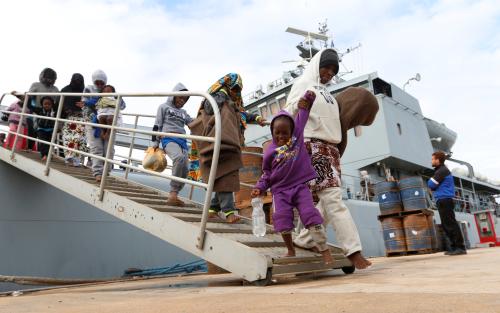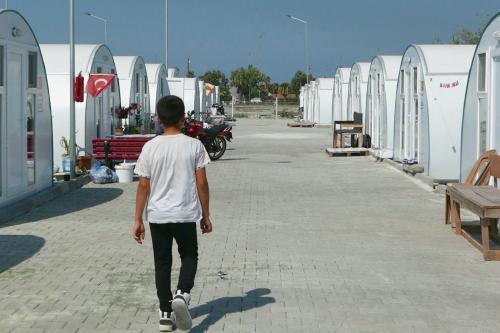There are many sides to the vociferous debate over international migration. While much of it focuses on the economic costs and benefits of migration in both recipient and sending countries, much less is known about the human side of the migration story. Most of what we know is based on anecdotal stories, such as a disproportionate focus on a visible crime committed by one immigrant, or heart-wrenching tales of what happens to illegal migrants who fail to reach their intended destinations. While these stories are important, they are not based on sufficiently large-scale and representative data that can inform the policy debate. Our new research uses worldwide data to focus on a little known story: what happens to the families of migrants who are left behind.
International migrants often leave their family members behind in the origin country, because it is costly for the whole family to move or because of strict immigration policies and uncertain conditions in the places they are going. Migrants often send home money (i.e., remittances) that benefit those left behind by increasing their consumption and improving their living conditions. At the same time, migration disrupts family life, which could have negative effects on the well-being of migrant-sending households living in the countries of origin. Previous work shows that migration could increase both the incomes and happiness levels of those who move. Yet how does the out-migration of family members affect the well-being of family members left behind in the country of origin? We explore this question in a recent paper, published in the Journal of Population Economics.
Academics and policymakers alike have increasingly included subjective measures of well-being in their arsenal of tools to assess the causes and consequences of complex processes such as migration. Subjective well-being relates to the notion ordinary people are the best judges of how their lives are going. Unsurprisingly, governments around the world are complementing objective welfare metrics with subjective well-being outcomes such as life satisfaction and happiness to assess individual welfare and societal progress and guide policymaking. In the context of our study, subjective measures allow us to draw a fuller picture of the effects of emigration on migrant family members staying behind than by simply looking at their consumption, income, or labor market participation.
The current evidence on the well-being consequences of emigration for those staying behind at the origin countries primarily comes from one-country studies in low- or lower-middle-income origin countries. Our paper fills this knowledge gap by studying a wide range of origin countries, including high-income countries, and by using several subjective well-being dimensions, which has not been done before. We further distinguish between hedonic (i.e., affective) and cognitive (i.e., evaluative) dimensions of subjective well-being. Positive hedonic well-being is about feelings such as joy and happiness at a particular point in time. Negative hedonic well-being includes experiences of stress, anger, sadness, or worry at a particular point in time. By contrast, evaluative well-being usually reflects people’s capabilities, means, and long-term opportunities, based on questions that ask respondents to evaluate their life satisfaction on a scale of 0 to 10.
We use data from the Gallup World Poll, which includes several subjective well-being questions and information on whether the respondent has household members abroad and whether the respondent’s family receives help in the form of money or goods from abroad. We analyze 144,003 left behind individuals living in 114 countries during 2009-2010 and uncover both the common trends in a set of varied countries and differences across country groups.
We find that having family members abroad is associated with higher levels of life satisfaction and with positive effect among the left behind, and that receiving remittances is linked with even greater increases in life satisfaction, especially in poorer contexts—both across and within countries. Specifically, remittance receipt corresponds to a 2 percent increase in life satisfaction (evaluated at the sample mean of life satisfaction of 5.495) (see Figure 1). As we explain in the paper, this result is likely due to the improvements in living standards or the different social status remittance-receiving families could have in the community. The additional well-being influence coming from having relatives abroad is about the same size of that of the well-being effect of remittances. This may reflect that those left behind may derive satisfaction or joy from knowing that their family members realize their potential abroad. Having a family member living in a different country could also increase the future chances of moving abroad for the left-behinds. We find similar results for positive affect: simply put, the daily experiences of happiness of the left behinds seem to improve. Thus, the out-migration of family members influences both life evaluations and positive emotions through an income channel (remittances) and a residual psychological channel (having relatives abroad).
Figure 1
Yet at the same time, we discover that having household members abroad is associated with increased stress and depression for the left-behinds, and remittances do not offset these conditions. Figure 2 illustrates this point. At the same time, however, remittances are statistically unassociated with stress and depression as the error band around these estimates crosses the 0-line, suggesting that the stress and depression consequences of remittances are indistinguishable from zero. Taken together, Figures 1 and 2 show that while remittances “buy happiness,” they do not relieve the pain of separation.
Figure 2
We also find that the out-migration of family members appears less traumatic in countries where migration is more common, which also tend to be poorer, indicating that people in such contexts are used to coping with separation. Migrant-sending households in low-income countries often gather in informal groups to help each other to share information or when preparing for migration. But receiving remittances in high-income countries is linked with depression experiences, possibly because getting money from relatives abroad in prosperous countries with relatively generous welfare systems is a marker of destitution or disadvantage and, as such, also leads to depression. Thus, in countries where emigration is less common, such as in richer countries, there is room for policies to mitigate the negative experiences of stress and depression for vulnerable groups of household members staying behind through encouraging formal or informal support groups and stress and depression prevention programs.
Overall, our findings demonstrate that the out-migration of family members and their remittances can improve well-being through easing budget constraints and enhanced financial security, there are also significant psychological costs to the large numbers of family members of migrants. More generally and not only for this reason, emigration cannot be a substitute for economic and institutional development in the countries from which migrants originate.











Commentary
International migration: What happens to those left behind?
September 13, 2018